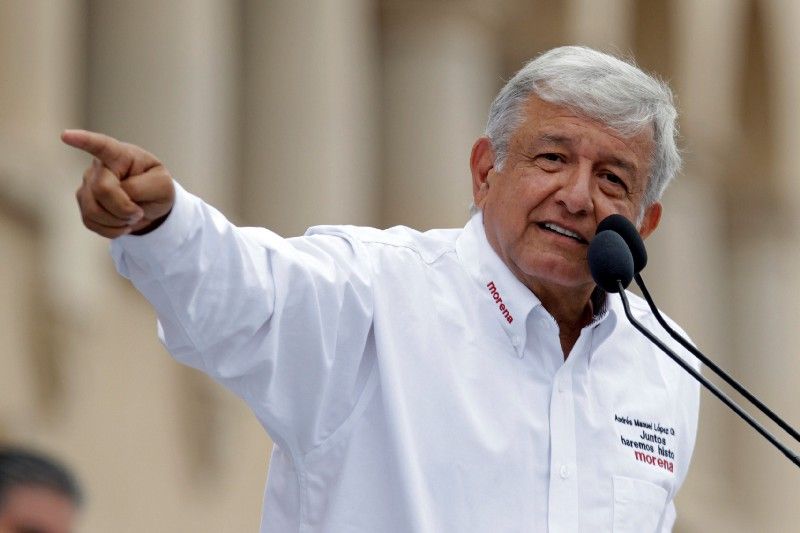June 29, 2018
On Sunday, Mexican voters will elect Andres Manuel Lopez Obrador, widely known as AMLO, as their next president. Mexico will have a new leader, Latin America will have a new voice, and Donald Trump will have a new foil.
Who is AMLO?
“Friend of the working man”: Mexico’s first “leftist” president since the 1930s, this son of village shopkeepers knows his working-class audience. His support is strongest in the country’s poor rural south, a region he promises to revitalize, and in the progressive-leftist stronghold of Mexico City. Over the years, AMLO, 64, has cultivated an image as a modest, honest, hard-working public servant. That image, more than any policy proposal, defines his appeal.
The Capable Executive: As Mexico City’s mayor (2000–2006), AMLO built a reputation as a leader focused on results. He proved willing to work with political opponents to expand pension protections, build roads to ease traffic, and restore dilapidated downtown infrastructure.
The determined politician: This is AMLO’s third run for president. After losing in 2006 by less than one percent of the vote, he accused his opponent of fraud, and his supporters occupied the center of the capital for several months. In 2012, he lost again. He’s now finally on the verge of victory.
The pragmatist: Though he does want the State to dictate the role of public and private players in the economy, AMLO has worked hard to persuade Mexicans he’s not a Hugo Chavez-style radical ideologue. He rails against a corrupt political elite but says he won’t raise taxes or confiscate land.
Nor is he a Chavez-style firebrand. After Trump’s election, AMLO published a book called “Listen, Trump” which included a passage that compared Trump’s descriptions of Mexicans with Nazi descriptions of Jews. But aware that Mexico needs good relations with the US, he has since taken a more circumspect approach and has reportedly worked behind the scenes to build ties with Trump advisors. AMLO won’t be silent if Trump attacks, but he’s unlikely to fire the first shot.
The president: AMLO’s likely landslide will boost his coalition to a majority in the lower house of Mexico’s congress and sizeable delegation in its Senate. That’s enough to get some things done, but he’s unlikely to realize the highest hopes or deepest fears that his career and campaign have aroused.
In particular:
- On fighting inequality, he promises free education and guaranteed jobs for the young, more generous pensions for the elderly, and lower taxes for Mexican companies — all paid for, he says, by ending corruption.
- On NAFTA, he’ll delay progress by appointing a new negotiating team, but economic necessity and political self-interest ensure he’ll want a deal.
- On corruption, be skeptical that AMLO, or anyone else, can take on the broad cross-section of Mexico’s political and business elite necessary to make a meaningful near-term difference.
- On violent crime, AMLO is simply overmatched. During this election campaign, the most violent in Mexico’s history, more than 120 politicians have been murdered, the national homicide rate has hit record levels, and violence has spread to new areas. Drug cartels have coopted local governments and police. In response, AMLO offers vague promises about a renewed Security Ministry, a national advisory council, an amnesty program for small-fry drug dealers, greater investment in education, and opportunities created by a stronger economy.
The bottom-line: A candidate can hope to be all things to enough people. Elected leaders must deliver. AMLO’s honeymoon may prove shorter than he expected.
More For You
How is the US is reshaping global power dynamics, using tariffs and unilateral action to challenge the international order it once led? Michael Froman joins Ian Bremmer on GZERO World to discuss.
Most Popular
- YouTube
In this Quick Take from Munich, Ian Bremmer examines the state of the transatlantic alliance as the 62nd Munich Security Conference concludes.
- YouTube
At the 2026 Munich Security Conference, Brad Smith announces the launch of the Trusted Tech Alliance, a coalition of global technology leaders, including Microsoft, committing to secure cross-border tech flows, ethical governance, and stronger data protections.
When the US shift from defending the postwar rules-based order to challenging it, what kind of global system emerges? CFR President Michael Froman joins Ian Bremmer on the GZERO World Podcast to discuss the global order under Trump's second term.
© 2025 GZERO Media. All Rights Reserved | A Eurasia Group media company.
